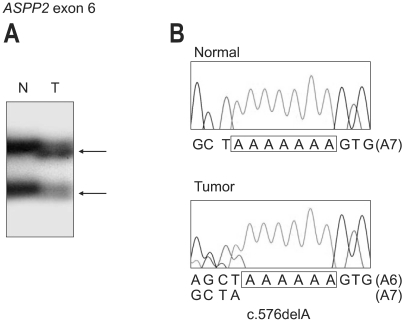To the editor,
In most human cancers, functions of p53 tumor suppressor are inactivated by many mechanisms, most commonly by somatic mutation.1 Alternatively, p53 is inactivated by genes whose protein products interact with p53.1 Apoptosis-stimulating protein of p53-1 (ASPP1) and -2 (ASPP2) promote p53-mediated apoptosis by enhancing its transactivation function.2 ASPP2+/- mice suffer from an increased incidence of tumorsm,3 suggesting it as a haploinsufficient tumor suppressor gene. However, neither of ASPP1 or ASPP2 mutation has been reported in cancers.
Microsatellite instability (MSI) is characterized by length alterations in repeated DNA sequences, and 10-30% of colorectal cancer (CRC) and gastric cancer (GC) are categorized as MSI-positive cancers.4 In a public database, we found an A7 repeat in exon 8 of ASPP1 and an A7 repeat in exon 6 of ASPP2. To see whether these A7 are mutated in GC and CRC with MSI, we analyzed them by polymerase chain reaction (PCR)-based single-strand conformation polymorphism (SSCP) as described previously.5 We analyzed 32 high-MSI (MSI-H) and 13 low-MSI (MSI-L) GC, and 38 MSI-H and 15 MSI-L CRC. We used two primer pairs that amplified each A7 of ASPP1 and the ASPP2. Tumor and normal DNA from microdisscted cells were amplified by the PCR. Radioisotope ([32P]dCTP) was incorporated into the PCR for detection by SSCP. Direct DNA sequencing was performed in the cancers with mobility shifts in the SSCP.
The PCR-SSCP analysis of ASPP2 identified aberrant bands in one GC with MSI-H (3.1%) and two CRC with MSI-H (5.3%), but none in those with MSI-L (Fig. 1). Normal DNA of the patients showed no shifts, indicating the mutations had risen somatically. Direct DNA sequencing identified an identical ASPP2 deletion mutation in the A7 repeat (c.576delA), which would result in a premature stop (p.Val193fsX1) and resembled a typical loss-of-function mutation. For ASPP1, there was no aberrantly migrating SSCP band in the cancer tissues.
Fig. 1.
Mutation of ASPP2 in a gastric carcinoma with high-microsatellite instability. (A) PCR product of ASPP2 from a colon carcinoma shows aberrant bands (arrows in lane T) as compared to single-strand conformation polymorphism from normal tissue (lane N) of the same patient. (B) Direct DNA sequence analysis shows a heterozygous A deletion within the A7 in tumor tissue compared to normal tissue.
As a possible mechanism for p53 inactivation, we analyzed ASPP1 and ASPP2 mutations in their repeat sequences and found some of the cancers with MSI-H harbored ASPP2 frameshift mutation. In colon, tumors with MSI have frameshift mutations in specific target genes, and fewer mutations are found in K-RAS and p53.4 Although the incidence of the ASPP2 mutation is not high, our data indicate that the ASPP2 mutation could partially explain a p53-inactivating mechanism in GC and CRC with MSI.
Four ankylin repeats (amino acids 930-1047) and an SH3 domain (amino acids 1064-1114) of ASPP2 are essential for the interaction of ASPP2 with p53.2,3,6 The frameshift mutation identified in this study (p.Val193fsX1) would remove ankylin repeats and SH3 domain, and pro-apoptotic function of ASPP2 may be decreased in the affected cancers. Our data suggest that decreased p53 functions by the ASPP2 mutation might possibly contribute to pathogenesis in MSI-H cancers. Whether inactivation of ASPP genes further contributes to GC and CRC development in addition to the frameshift mutation of ASPP2, mutational analysis of entire coding region of ASPP1 and ASPP2 genes is required in future studies.
ACKNOWLEDGEMENTS
This study was supported by a grant from Education, Science and Technology of Korea (2009-007-1498).
References
- 1.Vogelstein B, Lane D, Levine AJ. Surfing the p53 network. Nature. 2000;408:307–310. doi: 10.1038/35042675. [DOI] [PubMed] [Google Scholar]
- 2.Samuels-Lev Y, O'Connor DJ, Bergamaschi D, et al. ASPP proteins specifically stimulate the apoptotic function of p53. Mol Cell. 2001;8:781–794. doi: 10.1016/s1097-2765(01)00367-7. [DOI] [PubMed] [Google Scholar]
- 3.Kampa KM, Acoba JD, Chen D, et al. Apoptosis-stimulating protein of p53 (ASPP2) heterozygous mice are tumor-prone and have attenuated cellular damage-response thresholds. Proc Natl Acad Sci U S A. 2009;106:4390–4395. doi: 10.1073/pnas.0809080106. [DOI] [PMC free article] [PubMed] [Google Scholar]
- 4.Imai K, Yamamoto H. Carcinogenesis and microsatellite instability: the interrelationship between genetics and epigenetics. Carcinogenesis. 2008;29:673–680. doi: 10.1093/carcin/bgm228. [DOI] [PubMed] [Google Scholar]
- 5.Lee SH, Shin MS, Park WS, et al. Alterations of Fas (Apo-1/CD95) gene in non-small cell lung cancer. Oncogene. 1999;18:3754–3760. doi: 10.1038/sj.onc.1202769. [DOI] [PubMed] [Google Scholar]
- 6.Patel S, George R, Autore F, Fraternali F, Ladbury JE, Nikolova PV. Molecular interactions of ASPP1 and ASPP2 with the p53 protein family and the apoptotic promoters PUMA and Bax. Nucleic Acids Res. 2008;36:5139–5151. doi: 10.1093/nar/gkn490. [DOI] [PMC free article] [PubMed] [Google Scholar]



